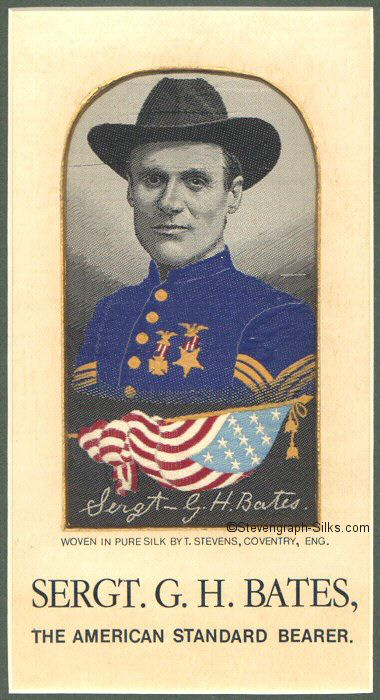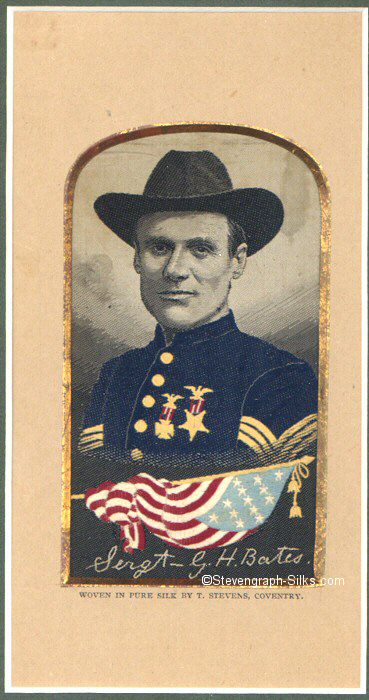by Sprake:
by Godden:
Gilbert H. Bates served as a sergeant in the Union army during the American Civil War. He was a great believer in liberty and the rights of the people. To prove that the Southerners could be trusted after their defeat, he marched 1,500 miles through Confederate country with the Union flag unfurled, without arms or money, to prove the hospitality of the people. He was welcomed by the President on his arrival in Washington, having proved his point and helped to reunite the American people.
Later, he continued the work, speaking throughout the United States, also visiting Great Britain in 1872 and carrying the Stars and Stripes from Gretna Green to London. Sergeant Bates continued to give free public speeches, always under his celebrated flag, until April 1886.
The Stevengraph portrait silk titled SERGT G. H. BATES was first listed on label 23+26+2 of 1887, and the title was included in an advertisement of July 1887. It does not occur on labels subsequent to 23+34, except for label 29+38. Examples normally have a type C2 card-mount and a story-label.
Other comments:
This silk portrait usually has a biography of Bates as the rear label:
From Mr. Frank Richmond's "Notes on American Celebrities":-
GILBERT H. BATES (SERGEANT BATES)
Was born and spent his boyhood days in Livingston Co. New York. He descends
from two of the oldest colonial families of New England. His father and
forefathers for centuries back were all soldiers, and always on the side of
liberty when liberty was the question at issue. The Sergeant went to Wisconsin
just before the outbreak of the late war of the rebellion, he and his three
brothers entering the Union Service from that State. After the surrender at
Appomattox and Raleigh, the great question was, "Have the Southern people given
up the contest in good faith?" Many politicians asserted, and a considerable
portion of the Northern people seemed to believe that they had not, that they
would neither respect, obey, nor assist in maintaining the laws. And there was
considerable excuse for that belief. Sergt. Bates believed that the more
intelligent elements of the South, the veteran soldiery especially, surrendered
in good faith, and that they could be trusted. He believed that the American
people had had three great and all-important objects to attain, and in the
attainment of which every citizen should feel personal interest: First, peace
to the community, to the State, and the nation; second, the restoration of
fraternal relations between the two great sections of the country, by
overcoming the hates and animosities engendered by the war, through the
cultivation and promotion of mutual interests; third, the creation and
maintenance of a grand national brotherhood, a political brotherhood, based
upon knowledge, industry, morality, and loyalty to the principles of
government, taught and maintained by the founders of the Republic. To prove his
belief and promote the above objects, he went to, and unfurled the Union flag
on the streets of Vicksburg, at a time when it was honestly believed by
thousands of Northern people that it was certain death for a Northern Union man
to "show his face down South." He carried the flag unfurled through the very
heart of the confederacy to Washington; travelled the entire distance - 1,500
miles - on foot, went unarmed at all times, and without money, thus proving the
hospitality of the people, as well. Results proved the correctness of his
belief and confidence in the people, as he met with a continuous ovation of
welcome and good-will from the Mississippi to the Potomac. On reaching the
national capital, he was publicly received and honoured by President Johnson
at the Executive Mansion, by members of the Senate, and House of
Representatives, and by the citizens, soldiers, and sailors of Washington. He
did not stop his work with the unfurling of the flag at Washington's monument,
where the finally reception ceremonies took place, but immediately went before
the people as a public speaker, and for twenty years his voice rang out,
appealing for national unity, and the placing of principle above partizanship,
and the prosperity of the nation above mere party success. He carried his work
in a non-partizan spirit into the most populous and into the wildest inhabited
regions of the Northern and Southern States. He frequently addressed two, and
sometimes three audiences on the same day, delivering, in November, 1882,
seventy-five public speeches, speaking on no occasion less than one hour and
thirty minutes. He always spoke under or with the national flag in his hand,
making his strongest and most effective appeals through it, in his efforts to
arouse the national pride and patriotic sentiments of his hearers. His
addresses were free to all. Having used up his entire means in the cause, and
both voice and health failing him, he was forced to cease his public efforts
in April, 1886. His family - wife and four children - now reside at Saybrook,
McLean Co., Illinois.
The following extract from a letter from Sergt. Bates, explains
the motives that actuated him in carrying the "Stars and Stripes" from Gretna
Green to London in 1872: "Lets us unite the patriotism and intelligence of
England, Ireland, Scotland, and America, in the interests of humanity, and
thus carry civilization to, and maintain it upon, a much higher plain of
morality, polities, and religion."
This picture is woven in Pure Silk by THOMAS STEVENS, Stevengraph
Works, Coventry, and 34, Paternoster Row, London.



